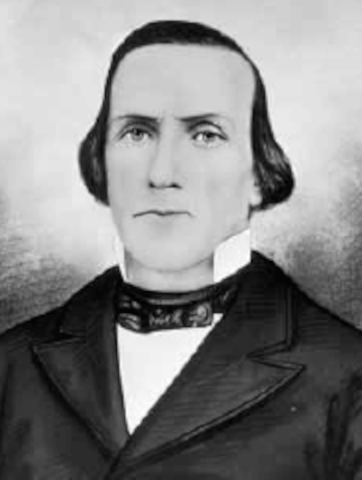Luke S. Johnson
(1807-1861)


By Susan Easton Black
Luke’s missionary labors with companion Sidney Rigdon in Ohio led to the baptism of about fifty converts and the organization of a Church branch. His labors with Seymour Brunson in the Southern States led to the baptism of over a hundred converts and the organization of two branches. Yet Luke Johnson is best remembered for his sense of humor and his fierce loyalty to the Prophet Joseph Smith:
Passing by the home of Ezekiel [Johnson] on his way home from a council meeting late at night, [Luke] sighted a ladder leaning against the side of Ezekiel’s house—it happened to be close to the window of Ezekiel’s upstairs bedroom. [Luke] immediately seized upon the thought that this would be an opportune time to have Ezekiel’s wish of a voice from the unknown fulfilled. Climbing up the ladder, he proceeded, thusly; in a low pitched voice; EZEKIAL! EZEKIAL!! EZEKIAL!!! REPENT! REPENT!!! REPENT!!!! . . . It is said that Ezekiel did his best to do as the voice had commanded.1
When a Baptist clergyman called the Prophet Joseph Smith “a hypocrite, a liar, [and] an imposter,” Luke, the sheriff in Kirtland, followed the man to the edge of town, “making him travel pretty lively until he got a few rods over the line when I overtook him and said, ‘Sir, you are lucky to have got over the line, and out of my jurisdiction, or I should have arrested you.’”2
In May 1834 Luke marched with Zion’s Camp to Missouri, making “a declaration before I started that I would go into Jackson Co., or die in the attempt.”3 When cholera took the lives of fourteen in the camp, Luke dug the graves. “While brother Luke Johnson was digging, the cholera attacked him with cramping and blindness,” wrote Heber C. Kimball. “Brother Brigham laid hold of him and pulled him out of the grave, and shook him about, talked to, and prayed for him, and exhorted him to jump about and exercise himself, when it would leave him for a few moments, then it would attack him again; and thus we had the greatest difficulty to keep the destroyer from laying [him] low.”4
In February 1835 Luke was ordained an Apostle of the Lord Jesus Christ. Although it could be assumed that he honored his apostolic calling, such was not the case. Luke said, “I lost the Spirit of God, and neglected my duty; the consequence was, that at a Conference held in Kirtland, September 3, 1837 . . . I was cut off from the Church.”5 The following Sunday, he confessed his wrongs and returned to Church fellowship. But four months later, he joined apostates in publicly denouncing the Prophet Joseph and the Church.
Even though Luke vocally expressed apostate sentiments, he showed a particular kindness to Joseph Smith Sr. When Father Smith was incarcerated on a trumped-up charge, Luke wrote,
I put him in a small room adjoining the entrance from the office. I took a nail out from over the window sash, left the room and locked the door, and commenced telling stories in the courtroom, to raise a laugh, for I was afraid they would hear Father Smith getting out of the window. When the court called for the prisoner, I stepped into the room in the dark and slipped the nail into its place in the window, and went back and told the court that the prisoner had made his escape.6
Yet his love for Father Smith was not enough to bring him back into Church fellowship. Luke was separated from the Church for eight years. Most of those years, he resided in Ohio, except one year when he taught school and studied medicine in Cabal County, Virginia.
It was not until 1846 that Luke and his family returned to the fellowship of the Saints. “I have stopped by the wayside and stood aloof from the work of the Lord,” Luke wrote. “But my heart is with this people. I want to be associated with the saints, go with them into the wilderness, and continue with them to the end.”7 On March 8, 1846 he was baptized by his brother-in-law Orson Hyde.
Luke journeyed in the Vanguard Company to the Salt Lake Valley under the leadership of Brigham Young in 1847. He and his family settled in Rush Creek, a small community in Tooele County renamed Johnson’s Settlement (later St. John) in honor of Luke Johnson. Luke was much beloved by the settlers in St. John. Hannah Burridge recalled one winter when her feet were “wrapped in gunny-sacks, to keep them warm,” Luke asked her, “Hannah, is that the best you can do for shoes?” When informed that she did not have shoes, the next morning he presented her “with a good substantial pair of shoes.” When an argument ensued between Luke and a rogue named Jake, the rogue drew his gun and said, “Now, Johnson, I’m going to kill you.” Luke calmly replied, “Jake, you’re not fool enough to try to shoot a man with a gun without a cap.” When Jake lowered his eyes to check the cap, Luke over-powered him.8
In December 1861 Luke died at the Orson Hyde home in Salt Lake City at age 54.
1. Darrel K. Loosle, “Luke S. and Lyman E. Johnson-Apostles,” p. 2. Church History Library.
2. Luke Johnson, “History of Luke Johnson,” Millennial Star 26 (December 31, 1864), pp. 836; Luke Johnson, “History of Luke Johnson,” Millennial Star 27 (1865), pp. 5-7.
3. Johnson, “History of Luke Johnson,” Millennial Star 27 (1865), p. 5
4. Heber C. Kimball, “Extract from the Journal of Heber C. Kimball,” Millennial Star 26 (August 27, 1864), p. 551.
5. Johnson, “History of Luke Johnson,” Millennial Star 26 (1865), p. 6.
6. Ibid.
7. “Deposed Church Official Won Reinstatement,” LDS Church News, November 19, 1960.
8. Loosle, “Luke S. and Lyman E. Johnson-Apostles,” p. 13.
Additional Resources
- Biography of Luke S. Johnson (josephsmithpapers.org)
